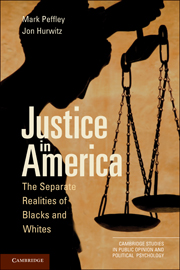Book contents
- Frontmatter
- Contents
- List of Tables
- List of Figures
- Acknowledgments
- 1 Introduction
- 2 Racial Bias in the Justice System
- 3 The Role of Fairness
- 4 The Consequences of Fairness
- 5 The Consequences of Fairness
- 6 Conclusions
- Appendix A National Survey and Survey Items
- Appendix B Examining Reciprocal Effects of Unfair Treatment and Neighborhood Discrimination
- References
- Index
- Titles in the series
4 - The Consequences of Fairness
Polarized Reactions to Police Brutality and Racial Profiling
Published online by Cambridge University Press: 05 June 2012
- Frontmatter
- Contents
- List of Tables
- List of Figures
- Acknowledgments
- 1 Introduction
- 2 Racial Bias in the Justice System
- 3 The Role of Fairness
- 4 The Consequences of Fairness
- 5 The Consequences of Fairness
- 6 Conclusions
- Appendix A National Survey and Survey Items
- Appendix B Examining Reciprocal Effects of Unfair Treatment and Neighborhood Discrimination
- References
- Index
- Titles in the series
Summary
In the previous chapter, we made two important claims: first, that fairness beliefs should be central elements in mass belief systems in the justice domain, and second, that such beliefs are essential to understanding the different ways that Whites and Blacks evaluate criminal justice issues. Accordingly, we proffered two measures of fairness, one asking respondents in the National Race and Crime Survey (NRCS) to evaluate the fairness of the wider system (i.e., system fairness) and another asking them to explain the harsher treatment of African Americans by the justice system (attributions of Black treatment). Unsurprisingly, we found a huge race gap in responses to both measures, with most Blacks rating the system as patently unfair and attributing Blacks' harsher treatment to biases in the system, and most Whites taking the opposite view, believing the system is fair and that Blacks deserve their harsher treatment. Our analysis of the sources of our two fairness beliefs led us to conclude that, as expected, even though the two measures overlap, they are substantially independent of one another. Specifically, judgments about the general fairness of the justice system are, to a great degree, experientially determined; quite commonly individuals will think about their own experiences, and those of their neighbors, as they evaluate the system as a whole. In contrast, at least for Whites, stereotypes of African Americans figure prominently into assessments of whether the justice system treats Blacks fairly.
- Type
- Chapter
- Information
- Justice in AmericaThe Separate Realities of Blacks and Whites, pp. 111 - 139Publisher: Cambridge University PressPrint publication year: 2010

